LOST 037 - That's What SHE Sayid
Unpacking the TV show LOST — Season 4: Episodes 3-4

Here we go again, LOSTies. It's LOST time.
Previously, On LOST: Oceanic Flight 815 went down in bits and pieces yet a whole bunch of its passengers survived, one of whom owns a Frogurt stand. We'll call these survivors The Oceanics. The differentiator is necessary because there were other people who once upon a time lived on the island, too; a scientific community/utopia cult called The Dharma Initiative, who are all dead now but who did not clean up after themselves, and left behind all manner of litter and snacks and beer cans in 70s vans and polar bears and hatches and holes drilled into the electromagnetic power source at the heart of the island, and stations, and computers into which you have to enter numerical sequences in order to avoid the end of existence, and a Scotsman, and on and on.
Also on the island are the people who killed The Dharma Initiative for being environmentally unfriendly dicks. This is a cult/religion/paramilitary organization that the Oceanics call "the Others," but who I call "Jacobians" because it helps us remember the salient fact that they worship an entity/dude named Jacob. The Jacobians have been on the island for centuries, maybe millennia. We'll get to Jacob some other time.
This island is so full of mysterious mysteries you would not believe it, but the people who live there have to believe it, because they are there, and so are the mysteries. That's just the way it goes.
One of the Oceanics has gotten messianic in response to all this mystery. His name is John Locke, who is a man of little importance off-island, but harbors a secret few know: This island has mysteriously healed his spinal injury and restored his legs to functionality. He also harbors a secret we will only ever be able to discern through hints and clues and pattern recognition, which is that he is being groomed by a malevolent entity, who is hostile to both humanity and Jacob, which is why I call this entity "The Adversary." The Adversary has told Locke that he is destined to become the unifying leader of all factions on the island. Locke really likes being told this. It's his favorite flavor of ice cream.
Oh and there's a businessman/douchebag named Charles Widmore who wants to find/acquire the island, and now he's found it, and has sent a boat to it, possibly to acquire it, certainly to remove the Jacobian leader Ben Linus from it, one way or another. There's a lot of people on this boat, it seems. Some of the people on the boat have already come to the island on a helicopter. Some of these people are twitchy. Some are sarcastic. Some have pretty blue eyes. The pilot might be drunk. The twitchy one is a physicist named Daniel Faraday, who deals with time travel.
Yeah get ready for the time travel, because it is coming.
Subscribing to The Reframe is free.
It's tough but fair. Subscribe now for free and never miss an essay. Pay whatever you want if you'd like to support the work of an independent writer.
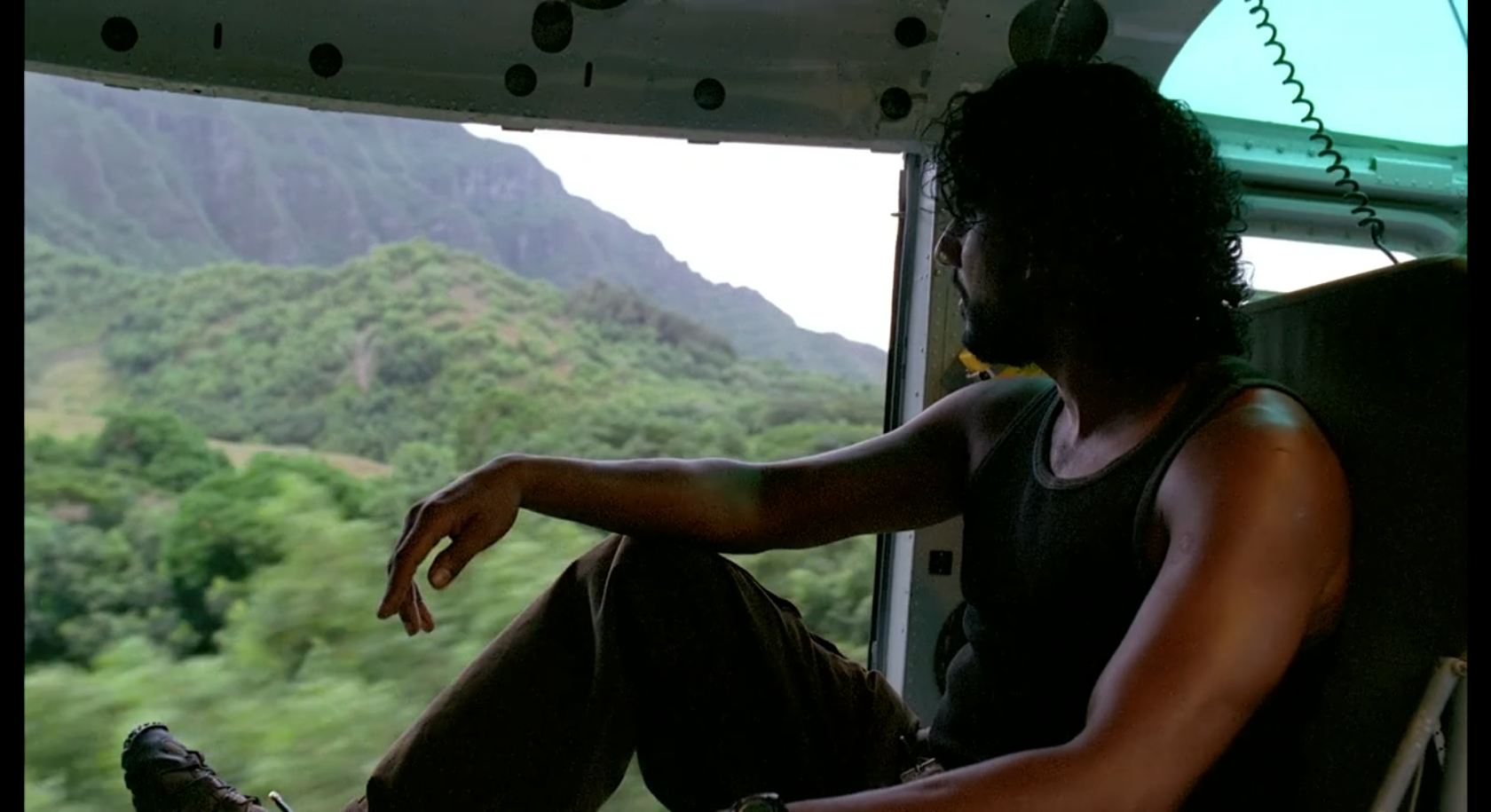
O B S E R V A T I O N
The last 2 episodes were so crammed with mythology and revelation that I devoted a whole entry to each of them. The season settles down a bit now in terms of plot density. Anyway, today's entry covers two episodes rather than just one.
The second of these episodes—which focuses on the character I feel suffers most at the hands of the story and the writing team—is particularly thin, as that character's episodes tend to be. Evangeline Lily does a really good job in this series, in my opinion, and makes Kate a compelling character even though the character as written is sort of incoherent and often vestigial to the male heroes. Kate and Lily are fine, but the series, normally so good at character, just never stops letting her down in that area. I mention this because as usual I am going to bag on a Kate episode, and I don't want it thought that this is because I don't like Kate, because actually I like her, I really really like her.
We've got an episode about a practical and skeptical man. Then we're going to have an episode about an impractical but trusting woman.
That's right, it's a Sayid episode and a Kate episode. Poor Kate.

Episode 3: THE ECONOMIST (Sayid): Sayid doesn't trust this new gang of interlopers, but they do have a rad chopper and a pilot (Frank) to fly it, and that's good enough for our resident security chief, because Sayid is a man who has never lost his focus on the mission of getting rescued. Unfortunately, the Oceanics have fractured into factions, and the Locke faction has kidnapped a member of the Freighter team: archeologist Charlotte. Frank isn't leaving without her, so Sayid makes a deal: He'll get Charlotte back, and in return Frank will give Sayid a chopper ride to the boat offshore. Sayid heads off toward Locke, with Miles and Kate in tow.
Speaking of Locke, he's looking for Jacob's cabin, which is actually probably the Adversary's cabin, and is clearly hoping to speak to some entity or other. However, the cabin's not where Locke expected, which is another piece of evidence for my belief that the cabin has extradimensional properties; it, like the island, is a moveable feast. Locke, clearly plussed or nonplussed (whichever one means 'consternated') says it doesn't matter, and off they go to the Dharma/Others barracks.
Faraday uses the spare time afforded by Sayid's side quest to run a little experiment between island and boat. He calls the boat and asks a colleague named Regina to send him a payload. She sends it, and marks its arrival ... but nothing comes. They're confused for about 30 minutes, until the payload arrives on a very precisely fired rocket that lands right at his feet. That's some crazy delivery tech, guys. If Bezos gets hold of it, it's game over. (Also, Frank tells Faraday "if Minkowski gets on [the line] you hang up right away," so let's observe that there are clearly factions on the boat, and they don't trust one another.) Anyway, the experiment demonstrates that the boat and the island are separated by a couple miles of space ... and also by 31 minutes of time. That's interesting! Daniel says "this is not good." Nobody has a follow-up question. Don't ask why it's not good, Jack. It's OK. You're doing great.
Sayid and the away team get to the barracks and get captured, but not before Sayid discovers a secret door in Ben's room leading to a Jason Bourne room with different passports bestowing Ben with different identities, and drawers full of bands of cash in different currencies. So that's interesting. While captured, Sawyer (he's part of the Locke faction if you're keeping score at home) makes a pitch to Kate: Why get rescued? We're both outlaws back home, this island is a magic world where we are people of consequence, and incidentally we are both extremely hot ... why don't we stay and snuggle? Kate considers.
Sayid makes a deal with Locke: He gets Charlotte sprung by giving Miles to Locke as a prisoner in exchange for her. This by the way is perfectly fine with the rest of the freighter gang, because Miles is a pain in their asses. Sucks to suck, Miles. Oh, and Kate isn't around either; she decided to stay with Sawyer. Jack has a sad.
Faraday urgently admonishes Frank to keep on the exact recommended bearing upon return, the implication being something really bad will happen if he doesn't. The chopper takes off with Frank, Sayid, Desmond (and the recently-Lockemurdered body of their comrade Naomi) aboard. Music swells. This is very exciting for first-time viewers. Other than Walt and Michael, who departed the show and about whose fate we know nothing so far, Sayid becomes the first Oceanic to leave the island (Desmond is along, but he is a Hatchy), and he's one we can reasonably assume the show will follow. We're going to see something happen off-island now, right? (Yes.) Maybe something good? (Yes.)
Flash forward: During the cold open, we see Sayid executing an Italian businessman on a golf course. Off-island, we learn, Sayid is working as an assassin for an unnamed employer, who, we learn, gives him lists of people to take out, murder-styles. We also learn that there was a settlement that made every member of the Oceanic Six (if you're keeping score, that's Hurley, Jack, Kate, Sayid, and two players to be named later) independently wealthy, which is perhaps why Sayid can now afford to get his James Bond on and jet-set around Europe. Right now he's in Berlin, seducing the personal assistant of a never-named Economist in order to get close enough to her boss for assassination. The assistant is named Elsa, and she falls for Sayid pretty much immediately. Sayid being Sayid, he also falls for her even though she's the job, the big sap.
Anyway, eventually the titular Economist pages Elsa, and Sayid blows his cover in order to warn Elsa what he's about to do. Elsa, far more ruthless than Sayid expected, shoots him in the shoulder, then gets on the phone with her boss seeking permission to kill him. She knew he was an assassin all along, it seems, and was using him to get the name of Sayid's own mystery boss. Before she can shoot him again, Sayid shoots her right in the parts she uses to live, and as she expires he looks very sad and tortured about the tragic death of his latest lady love. Yep, it's a Sayid episode!
Wounded, Sayid goes to a veterinarian's facility to get patched up by his mystery boss, whose face and very distinctive voice are deliberately (and rather hilariously) obscured during their conversation so that mystery boss can lean into frame for the big end-of-episode stinger reveal. Maybe some of us haven't already guessed it, but in the island-time story, Sayid very portentously says of [person] "the day I start trusting him is the day I would've sold my soul" in a way that attentive viewers know is a set up for dramatic irony.
Anyway, it's Ben. Of course it's Ben. Ben's all about the lists. And the secrets. And the murders.
Of note: the show makes a point of showing us that Naomi and Elsa have the same bracelet. Naomi's says N, I’ll always be with you. R.G. We don't see what Elsa's says. Maybe it says the same thing. Maybe R.G. gets his I'll always be with you bracelets in bulk and just inscribes new initials in the opening space.
End of Episode 3.
PS - Hurley has lots of funny lines in this episode. Just wanted to mention it.
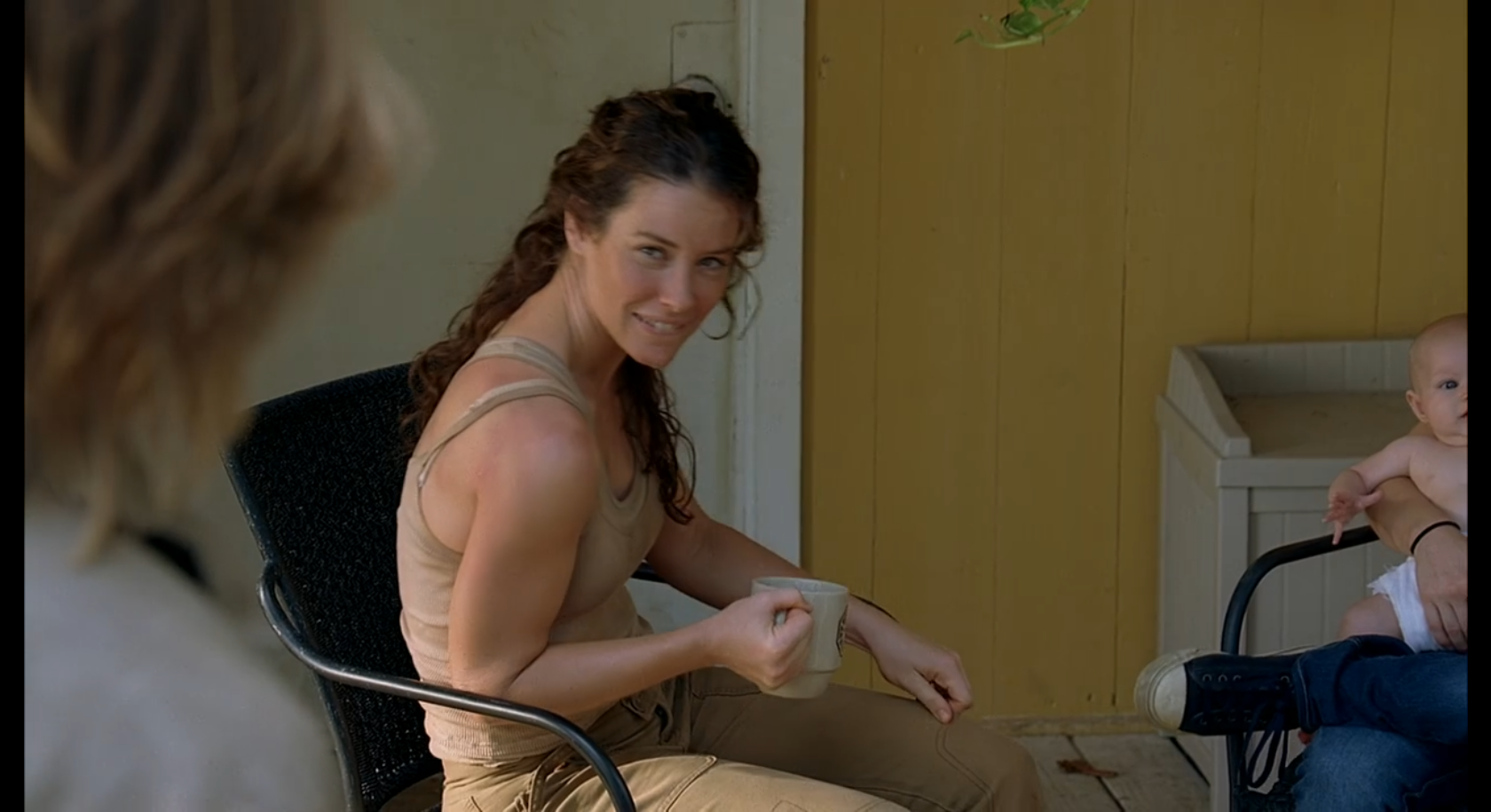
Episode 4: EGGTOWN (Kate):
Island time. It turns out Kate didn't stay at the barracks to play house with Sawyer. She's staying because she wanted to interrogate Miles about her current status as a fugitive and the freighter team's overall awareness of it. And it turns out Miles was quite content to be captured, because he wants to talk to Ben without his friends around. Ben Linus meanwhile is back in his comfort zone: imprisoned in a concrete basement with his face all beat to shit, psychologically tormenting John Locke to gain the upper hand, and being a catty little bastard-bitch. So many prisoners and former prisoners doing and wanting so many things! Kate breaks Miles out and brings him to Ben. Turns out Miles wants to extort Ben for $3.2 million dollars, payable in one week. In exchange, Miles will tell Widmore that Ben is dead. Ben seems interested in the offer, in a catty-little-bastard-bitch sort of way. Kate learns from Miles that everyone knows everything about her, and has a sad.
Locke is understandably pissed at Kate for her extracurricular activities, and banishes her from the barracks. Locke also puts a grenade in Miles' mouth and pulls the pin. Hold that trigger down, Miles! Sawyer un-banishes Kate and they mack on each other. In the morning, Kate heads back to the beach, and Sawyer calls her out, not without cause, for playing games with his poor thievin' heart.
Jack returns to the beach and introduces the Oceanics to the Freighter Folk (minus Miles). Everyone pretty much rolls with having a bunch of new characters around, which is to be expected; this is not their first rodeo, new-characters-wise. Charlotte gives Faraday a basic memory test, which he fails, but apparently it's better than it was. Then Jack and Juliet make Charlotte call the boat to see how Sayid and Desmond are doing, and they learn ... the helicopter hasn't arrived. It's been a day since they left. Faraday's face says: Shit o deer.
Flash-forward. Back in the States, Kate is being tried for her crimes. She's indisputably guilty, but she gets a sweetheart no-jail deal when the prosecution's star witness on the murder charge, Kate's mom, decides not to testify. Until then her rather bored lawyer had been staking his doomed defense on playing up Kate's heroism during the Oceanic crash in the made-up version of events that she and the other Oceanics are all telling. Jack takes the stand to give Kate a glowing character report, which is admitted into evidence even though Jack was recently engaged to the defendant (suggested here and confirmed in an upcoming episode). His testimony is undercut by Kate, who interrupts his testimony to say "this has nothing to do with anything," which is true. None of this is relevant to the fact that she killed her abusive stepfather and blew up the house he shared with her mother, and also robbed a bank in order to retrieve a toy airplane that reminded her of her lost innocence (and was in a safe deposit box?) and got her friend killed doing so, and also started no end of various high-speed chases and shootouts with the law across multiple continents.
Seriously guys, Kate is an international criminal fugitive, so her skating basically free on the retraction of a single witness to only one of her many many many crimes is very dumb, but the writers clearly wanted to dispense of a character plot that never worked very well, and LOST's strength has never been found in its understanding of procedural matters of law or business, so I think let's just look the other way here, and congratulate Kate on finally ridding herself of the worst character backstory in the series. Unfortunately the show will stay mostly obsessed with the burning question of which boy she is going to kiss.
Oh one other thing ... Kate has a son now. Kate's son is ... Aaron. That's Claire's son, in case you forgot. It's a nice way to make us really worried about Claire back in island-time. And Jack apparently doesn't want to be around the kid for ... reasons, and those reasons are why they aren't together anymore, and honestly so what when it comes to them being together or not.
This makes Aaron the 5th member of the Oceanic Six to be revealed, by the way, if you're keeping track.
So Kate is raising Aaron as her own. That psychic who sent Claire to the island because he was freaked out that Aaron would be "raised by another" is going to be so pissed you guys.
End of Episode 4.
PS - In this episode Hurley says "you just totally Scooby-Dooed me didn't you?" when Kate tricks him, so once again kudos to the Season 4 writers for deploying Hurley to excellent effect.
The Reframe is a reader-supported publication with a pay-what-you-want subscription structure. Free or paid, everyone gets the same newsletter, because those who can afford it pay. If you would like to support my work, and if you can afford to, consider upgrading to paid.
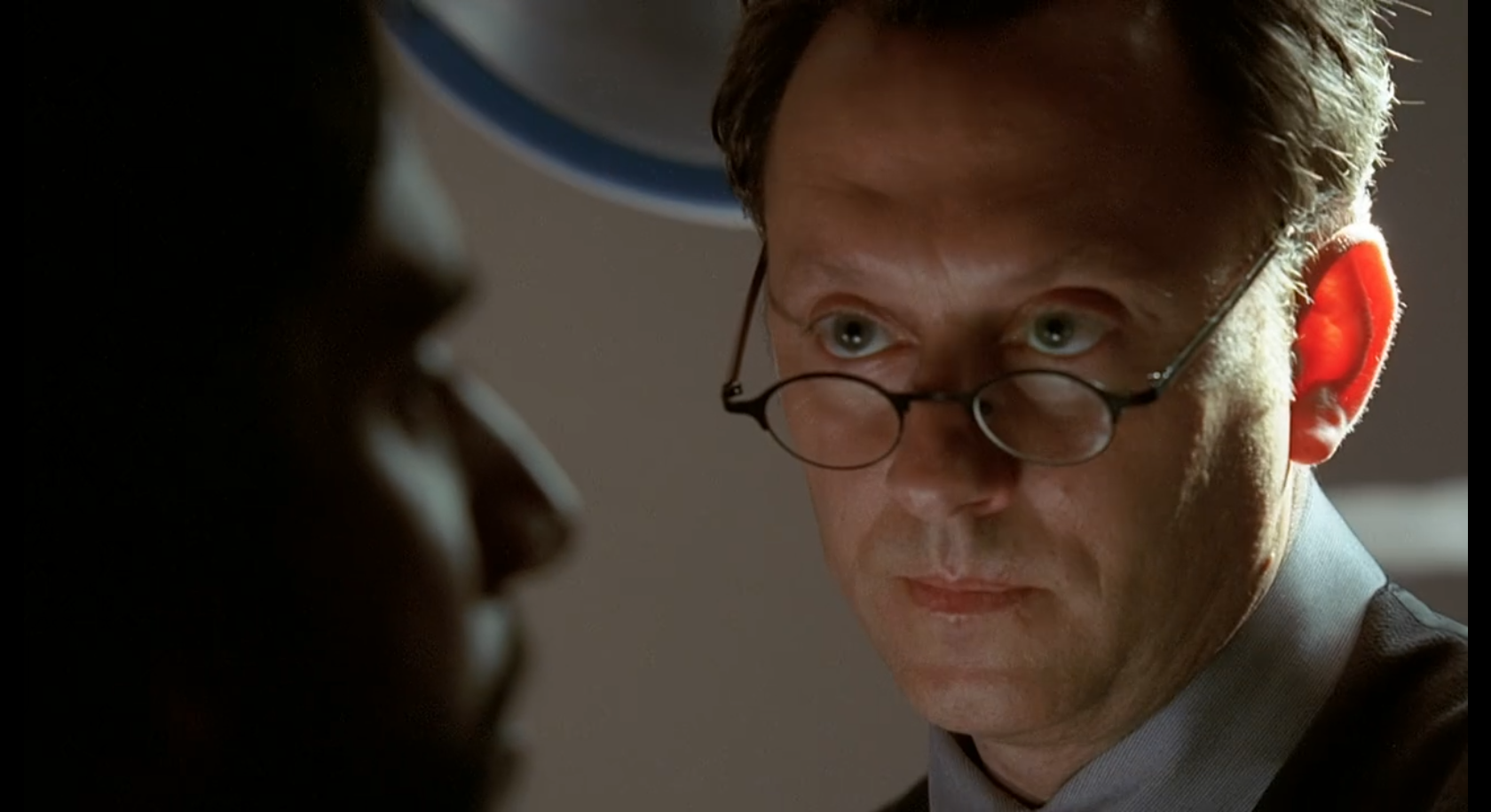
B E L I E F
On the observation/belief dialectic, it's important to remember that our beliefs come from our observation. This is what makes having a full view of the narrative so helpful; we have observed all there is to observe, so we can much more easily tell when a plot element is an important part of the undergirding backstory designed to expand the fictional universe and set up even bigger revelations, and when a plot element is just a functional detail designed to give you all the information it ever will provide.
For example ...
1) The Economist and the R.G. bracelets. Around the time these episodes aired, the identity and intentions and even existence of Jacob were open questions of great interest to LOST obsessives—and rightfully so, because these are indeed vitally important matters to following the underlying mysteries still to come.
But for many obsessives, the question of the identity of Sayid's mystery Economist loomed almost as large, and the R.G. bracelet shared by Elsa was a clue picked over as amateur sleuths went looking for characters with those initials. Clearly this "R.G." was a huge figure of great import to the story, right? Right?
Nope. The Economist is never named. We never even learn if Sayid eventually pops him. There are no characters of note with the initials R.G. Too bad.
As a viewer, you have a choice now. You can decide that it is the writers fumbling over their own clumsy story. Or you can ask yourself if this story element, all by itself, tells you something interesting about the story, and what that interesting thing might be. And here's the real story-ninja move: You can ask yourself, does not telling me more than this tell me something interesting about the story, too?
It's a question worth asking. The show isn't without fumbles. I try to point out the ones I see. But in this case, I believe the story is giving us all the answers we need. There are many many factions of people aware of the island, and all of them are battling each other. Most of them appear to have vast resources and sophisticated operations. One of these battlers appears to be an Economist who is making a Charlie's Angels sort of situation for himself, and he gives his Angels matching bracelets. Another of these battlers is clearly Ben Linus (see his secret Jason Bourne room). And there's Charles Widmore, of course. And Widmore's daughter Penny has an Arctic surveillance base watching for island-y activities and reporting to her. In earlier episodes, we've seen flashes of hints that this mysterious Eloise Hawking woman has gotten her grits up in the gears, too. That's a lot of factions! We'll see even more of them before this show is done, and from there I think we can presuppose even more factions that we never see named.
The first time I watched LOST, I was fully expecting to have these factions named and explained, and to have their efforts to capture and control the island laid out and explained. I was disappointed when these explanations never came, when I never received the information I'd need to understand all the internecine details of these various competing shadowy cabals of competitors.
But consider what not revealing all these details might suggest. To me, armed with the full narrative, it suggests: This struggle is happening because it has always happened, and it will always happen. The fact that it is happening is important in that it will drive this narrative, but none of these players and the details of their struggle matter very much, because it's the wrong struggle. They're all doomed to failure, evidenced by the fact that by the end of this narrative you will be able to observe that they all have failed, and they will fail because they all fundamentally misunderstand what it is they are dealing with.
That's what the omission of all these hoped-for details suggests to me. Incidentally, it is also how the entity embodied by Jacob seems to think about all of these machinations, too.
Why doesn't this element of the story ever become the focus of the story? Quite simply put, because it's not the focus of the story. It's not an oversight; the omission of these details from the story defines what is an important focus of the story by defining what is not an important focus. Jacob is important. R.G. isn't. The story looks at what is important to the story; it doesn't look at what isn't important. You can want it to look there, but you're making the same mistake as all these powerful and wealthy idiots, fighting over ownership of a thing that can never be owned.
This is the main reason, in my opinion, that LOST is often so badly understood. It constantly answers its questions this way; it's all strange angles and unexpected directions and old mysteries answered by new mysteries. In a world of dunks and swishes, LOST was a team of bank-shot specialists. They kept delivering buckets from the high glass.
This is a fascinating example of how the entire project of narrative fiction works. Many people get to the end of a story and realize that some detail never came back around and conclude that it was an error. Often these are the sorts of "unanswered hanging threads" that are presented as evidence that the whole thing was invented slipshod and without a good plan. This is sometimes the case, but often this reaction reveals a fascinating unwillingness for an observer of a complex narrative to manage their own expectations; it's an unwillingness that parallels the arc of characters like Jack or Locke, both of whom are so convinced of their opposing but similarly preconceived understandings of the world that they flatly refuse to acknowledge experiences that contradict those expectations, even as they experience them.
Which is a neat trick for the writers of LOST to pull off, in my view.
2) Factions on the boat. The most relevant thing we learn from all these bracelet/Economist revelations is that the Economist very likely had a mole on Charles Widmore's freighter: namely, Naomi. Ben claims to have somebody of his own on the freighter—about whom more soon. We're going to learn that Eloise Hawking (more about her someday) has some people on Widmore's freighter. So counting Widmore himself, that's four different factions aboard Widmore's freighter. I think it's fair to say there might be even more factions on there.
And this is helpful to know when watching a second time, because the people on the boat are all behaving very strangely. They don't trust each other, they're hiding things from each other, and some factions are going to take actions diametrically oppositional to what other factions are doing.
If you believe everyone on that boat is loyal to Widmore and his mission, than what the people on the boat do will seem haphazard and confusing. If you realize that it is not only likely that there are many different factions present on the boat all with competing goals and intentions, but certain, then the story is going to make a lot more sense, and I think it's OK to make that assumption, because it's a lot more fun to watch a story that makes sense. It's also safe to make that assumption because that is exactly what the story has been telling us.
And this is the reason for my belief, suggested in earlier installations, that the Oceanic 815 had many previously existing factions aboard. I said then I'd give my evidence. Well, this is it. We can observe that when vessels are going to this island, powerful people with vast resources make sure to get people representing their interests on board those vessels. It would actually be odd and unique if Oceanic 815 didn't have some moles on board. And that, I think, explains the way the Tailies behaved.
Or you can just say that the story is incoherent. To me, though, that's usually just a way of saying you're not paying attention.
3) Faraday's experiment. Here's another bank-shot. What does Faraday's experiment mean? He doesn't explain it. Nobody asks.
Here's what I think it means that: 1) the writers have decided to start hinting to their audience that this is going to turn into a time-travel show; 2) Faraday is clearly aware that the island has an achronologous (it's a word if I say it's a word) relationship to the rest of the planet and is monitoring that relationship; 3) the achronological disparity is about 30 minutes at the time of the experiment and it's getting worse; 4) this makes the precision of navigational bearing extraordinarily important to successfully navigating between the two, suggesting that the greater the achronology, the more precision is required; and 5) failing to keep precise bearing is likely to have horrible consequences. By the way, this also shows us that 6) Ben Linus, who gave very similar instructions to Michael and Walt when they sailed away, was aware of this fact, too, which means that 7) so were the writers, all the way back in Season 2, which suggests that 8) they were probably aware of this crucial aspect of the island's achronological relationship even earlier than that.
So that's what Faraday's experiment was about: conveying all that information to us in two scenes of about a minute each. That's efficient as hell, if you ask me. Bank shot off the highest of high glass.
Now ... if you want a whole episode that packs dense mythology and expository information with perhaps even greater efficiency, without losing narrative momentum or character-focused growth, have I got good news for you.
We just had an entry that covered two episodes. We may have the first episode that needs two entries to unpack coming up.
Here comes The Constant.
L O S T
Next Time: If You Have Tears Prepare to Shed Them Now
The Reframe is totally free, supported voluntarily by its readership.
If you liked what you read, and only if you can afford to, please consider becoming a paid sponsor. If you'd like to be a patron of my work, there's a Founding Member level that comes with a free signed copy of one of my books and thanks by name in the acknowledgement section of any books I publish.
Looking for a tip jar but don't want to subscribe?
Venmo is here and Paypal is here.
A.R. Moxon is the author of the novel The Revisionaries, and the essay collection Very Fine People, which are available in most of the usual places, and some of the unusual places. You can get his books right here for example. He is also co-writer of Sugar Maple, a musical fiction podcast from Osiris Media which goes in your ears. He would do anything for LOST, but he won't do that.


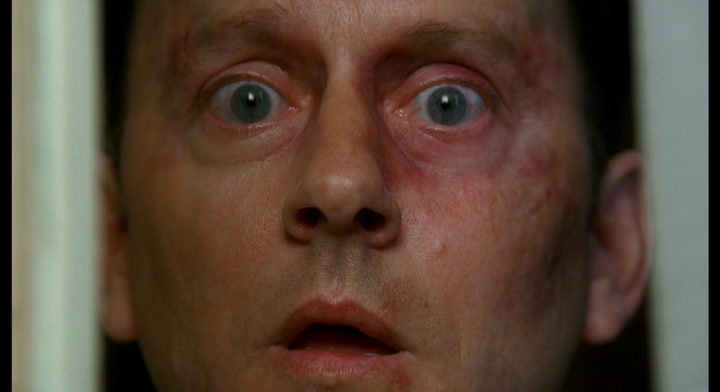
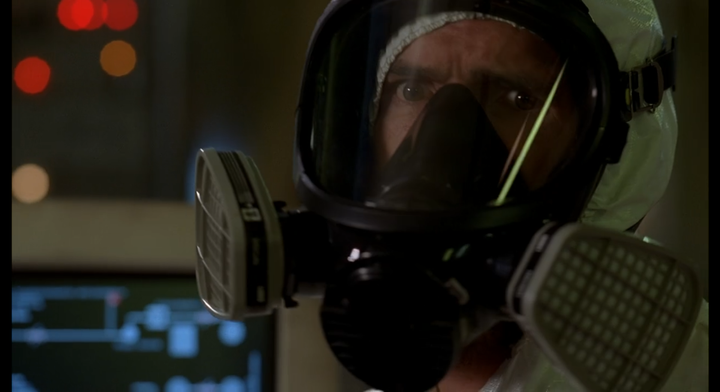
Comments ()